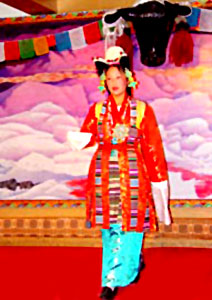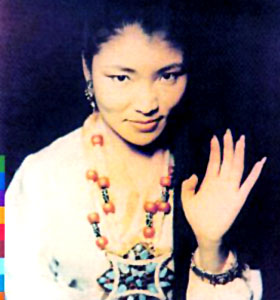 Tibetan Institute of Performing Arts is a home of Tibetan theatre among the community of Tibetan exiles in Dharamsala, Himachal Pradesh. This was established in 1959 after 100,000 refugees crossed into India, fleeing the Chinese annexation of Tibet. They preserved their customs and heritage, including the popular Lhamo opera, founded by the Buddhist lama Thangtong Gyalpo in the fourteenth century. He is said to have trained seven sisters in singing and dancing, accompanying them on percussion. The beauty of their creation apparently made viewers comment that `the Lhamo (goddesses) themselves are dancing`. By the nineteenth century, semi-professional troupes competed at festivals open to all and at official ceremonies in Lhasa, Tibet, supported by the Dalai Lama`s administration.
Tibetan Institute of Performing Arts is a home of Tibetan theatre among the community of Tibetan exiles in Dharamsala, Himachal Pradesh. This was established in 1959 after 100,000 refugees crossed into India, fleeing the Chinese annexation of Tibet. They preserved their customs and heritage, including the popular Lhamo opera, founded by the Buddhist lama Thangtong Gyalpo in the fourteenth century. He is said to have trained seven sisters in singing and dancing, accompanying them on percussion. The beauty of their creation apparently made viewers comment that `the Lhamo (goddesses) themselves are dancing`. By the nineteenth century, semi-professional troupes competed at festivals open to all and at official ceremonies in Lhasa, Tibet, supported by the Dalai Lama`s administration.
A Lhamo master from Kalimpong, West Bengal had performed at the Dalai Lama`s palace, rallied singers and dancers among the exiles in India to form a company in Dharamsala. Others in the community donated gorgeous brocade costumes that they no longer needed. The troupe travelled to various refugee camps, entertaining the Tibetans and reminding them of home. Now TIPA supports a company of fifty-five actors and backstage workers, along with their children. New members join very young and train for about a year, gradually specializing in serious or comic acting, dance, or music. TIPA stages an annual springtime all-day show, outdoors under a canopy decorated with auspicious symbols. It also takes part at such Tibetan government-in-exile functions as New Year and Uprising Day, tours Tibetan settlements elsewhere in India, and performs abroad.
 Sanctification of the acting space by three Ngonpas i.e. anglers in large, black goateed masks begin the performance and symbolize the ritual battle between good and evil. Two Gyalu or patriarchs participate in the rites as well. Six Ri-ngas i.e. female fairies form the chorus, but also enact goddesses and nymphs if required in the play. The Shung Shangen, or narrator, then enters and outlines the plot in a stylized recitative that concludes with a high-pitched shout. In the course of the show, he may explain some scenes, announce entrances or exits, and in shortened editions chant the songs. At last the performers come in, normally dancing.
Sanctification of the acting space by three Ngonpas i.e. anglers in large, black goateed masks begin the performance and symbolize the ritual battle between good and evil. Two Gyalu or patriarchs participate in the rites as well. Six Ri-ngas i.e. female fairies form the chorus, but also enact goddesses and nymphs if required in the play. The Shung Shangen, or narrator, then enters and outlines the plot in a stylized recitative that concludes with a high-pitched shout. In the course of the show, he may explain some scenes, announce entrances or exits, and in shortened editions chant the songs. At last the performers come in, normally dancing.
The classical repertoire comprises ten verse dramas, all based on the importance of Buddhism. They consist of sutras from India adapted to Tibetan culture, Buddhist myths, and religious events from Tibetan history. The singers deliver the narrative in fast chanting, known as namthar. In addition, some dialogues are improvised, for instance in comic interludes, often commenting on current affairs, thereby making each performance different. The emotions evoked span a wide range from reverential prayer to satire of hallowed people or institutions. The styles used are equally diverse. Sometimes there are rich poetry, musical songs, vigorous dances, slapstick, acrobatics, and also mime. Only a statue of Thangtong Gyalpo remains on the bare stage, but the colourful costumes compensate and, along with the actors` gaits, form a code to identify whether the characters are evil or virtuous. Cymbals and drums provide the music, while a change in rhythm and movements by everyone signifies the end of a scene.
Traditionally, Lhamo takes several days, and each day about seven hours, but the duration has been shortened to two hours to suit contemporary tastes, though TIPA`s annual showpiece remains full-length. TIPA also has a political agenda in its choice of repertoire, staging `historical drama` that promotes Tibetan national independence. Some Tibetans in China, therefore, dispute its authenticity for carrying patriotic propaganda. On the other hand, Lhamo in Tibet is now influenced by Chinese theatrical styles and sponsored by the Communist government.




















